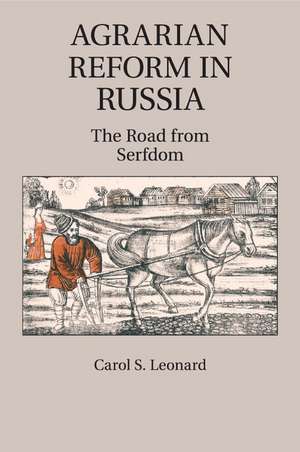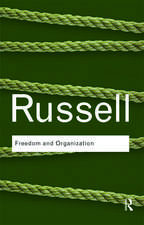Agrarian Reform in Russia: The Road from Serfdom
Autor Carol S. Leonarden Limba Engleză Paperback – 5 aug 2015
| Toate formatele și edițiile | Preț | Express |
|---|---|---|
| Paperback (1) | 325.93 lei 6-8 săpt. | |
| Cambridge University Press – 5 aug 2015 | 325.93 lei 6-8 săpt. | |
| Hardback (1) | 758.86 lei 6-8 săpt. | |
| Cambridge University Press – 5 dec 2010 | 758.86 lei 6-8 săpt. |
Preț: 325.93 lei
Nou
Puncte Express: 489
Preț estimativ în valută:
62.37€ • 65.28$ • 51.91£
62.37€ • 65.28$ • 51.91£
Carte tipărită la comandă
Livrare economică 31 martie-14 aprilie
Preluare comenzi: 021 569.72.76
Specificații
ISBN-13: 9781107546233
ISBN-10: 1107546230
Pagini: 420
Ilustrații: 25 b/w illus. 8 maps 37 tables
Dimensiuni: 151 x 228 x 24 mm
Greutate: 0.61 kg
Editura: Cambridge University Press
Colecția Cambridge University Press
Locul publicării:New York, United States
ISBN-10: 1107546230
Pagini: 420
Ilustrații: 25 b/w illus. 8 maps 37 tables
Dimensiuni: 151 x 228 x 24 mm
Greutate: 0.61 kg
Editura: Cambridge University Press
Colecția Cambridge University Press
Locul publicării:New York, United States
Cuprins
Part I. Dilemmas of Agrarian Reform in Russia: 1. Imperial reform, 1861–1913; 2. The NEP and Soviet era reforms, 1921–89; 3. Transition agrarian reform, 1991–2008; Part II. Russian Law and Rural Organization, 1861–2008: 4. Property rights reform; 5. Rural organization and entrepreneurship; Part. III. Russian Agricultural Performance, 1861–2008: 6. Technology and farming culture; 7. The productivity of Russian agriculture; Conclusion; Appendices.
Recenzii
'This book is rich and informative, placing agrarian reforms in a full macroeconomic context and allowing them to be understood as part of the history of Russian transitions. This is a must-read.' Brigitte Granville, Queen Mary, University of London
'There isn't another book on the market that succeeds in the ambitious goal of tying Russian agricultural reform to economic performance over more than 150 years. The conclusion that the positive effects of reform are only evident over a long period of time carries important policy implications.' Paul R. Gregory, University of Houston
'Agrarian Reform in Russia: The Road from Serfdom is a broad-reaching, ambitious survey and analysis of agricultural change and reform in Russia from the emancipation of 1861 to the present day … Anyone interested in the fascinating debate on the rural commune's origin, development, functioning, and legacy, and its role in maintaining tradition as well as facilitating change, will find this book an excellent starting place.' Revolutionary Russia
'An impressive book … packed with detail.' Slavonic and East European Review
'This is a richly-textured book, and it includes significant statistical evidence, especially relating to agricultural performance between 1861 and 1911. Its themes are illuminated by the author's own experience as an advisor to the Russian government on agricultural policy in the 1990s and Leonard's work is not simply a piece of historical scholarship, but offers broad observations on the nature of Agrarian policy making in Russia.' Peter Waldron, European History Quarterly
'There isn't another book on the market that succeeds in the ambitious goal of tying Russian agricultural reform to economic performance over more than 150 years. The conclusion that the positive effects of reform are only evident over a long period of time carries important policy implications.' Paul R. Gregory, University of Houston
'Agrarian Reform in Russia: The Road from Serfdom is a broad-reaching, ambitious survey and analysis of agricultural change and reform in Russia from the emancipation of 1861 to the present day … Anyone interested in the fascinating debate on the rural commune's origin, development, functioning, and legacy, and its role in maintaining tradition as well as facilitating change, will find this book an excellent starting place.' Revolutionary Russia
'An impressive book … packed with detail.' Slavonic and East European Review
'This is a richly-textured book, and it includes significant statistical evidence, especially relating to agricultural performance between 1861 and 1911. Its themes are illuminated by the author's own experience as an advisor to the Russian government on agricultural policy in the 1990s and Leonard's work is not simply a piece of historical scholarship, but offers broad observations on the nature of Agrarian policy making in Russia.' Peter Waldron, European History Quarterly
Notă biografică
Descriere
This book on Russia examines historical reforms and interventions affecting agriculture and assesses their impact on the rural economy.














